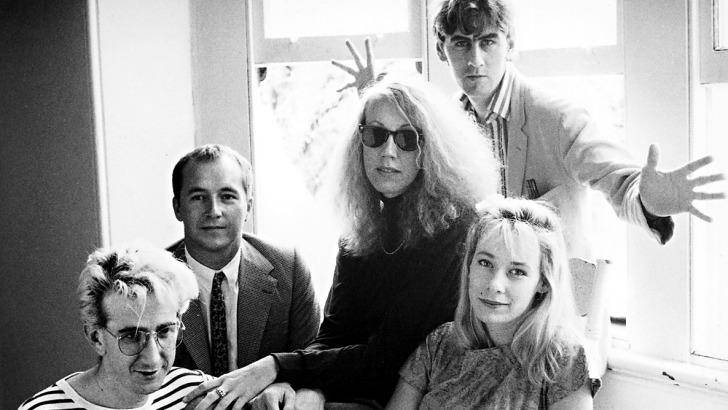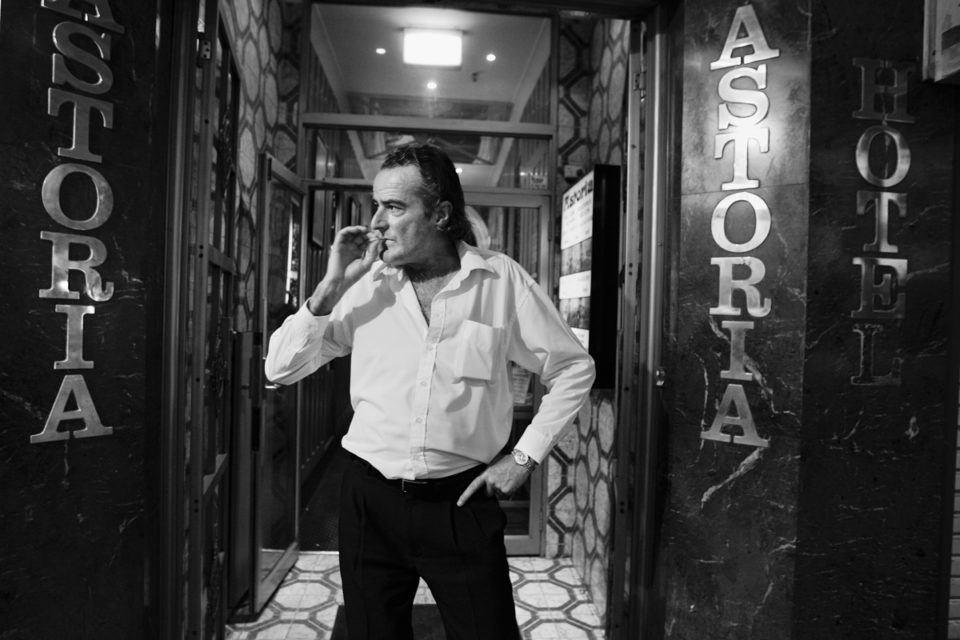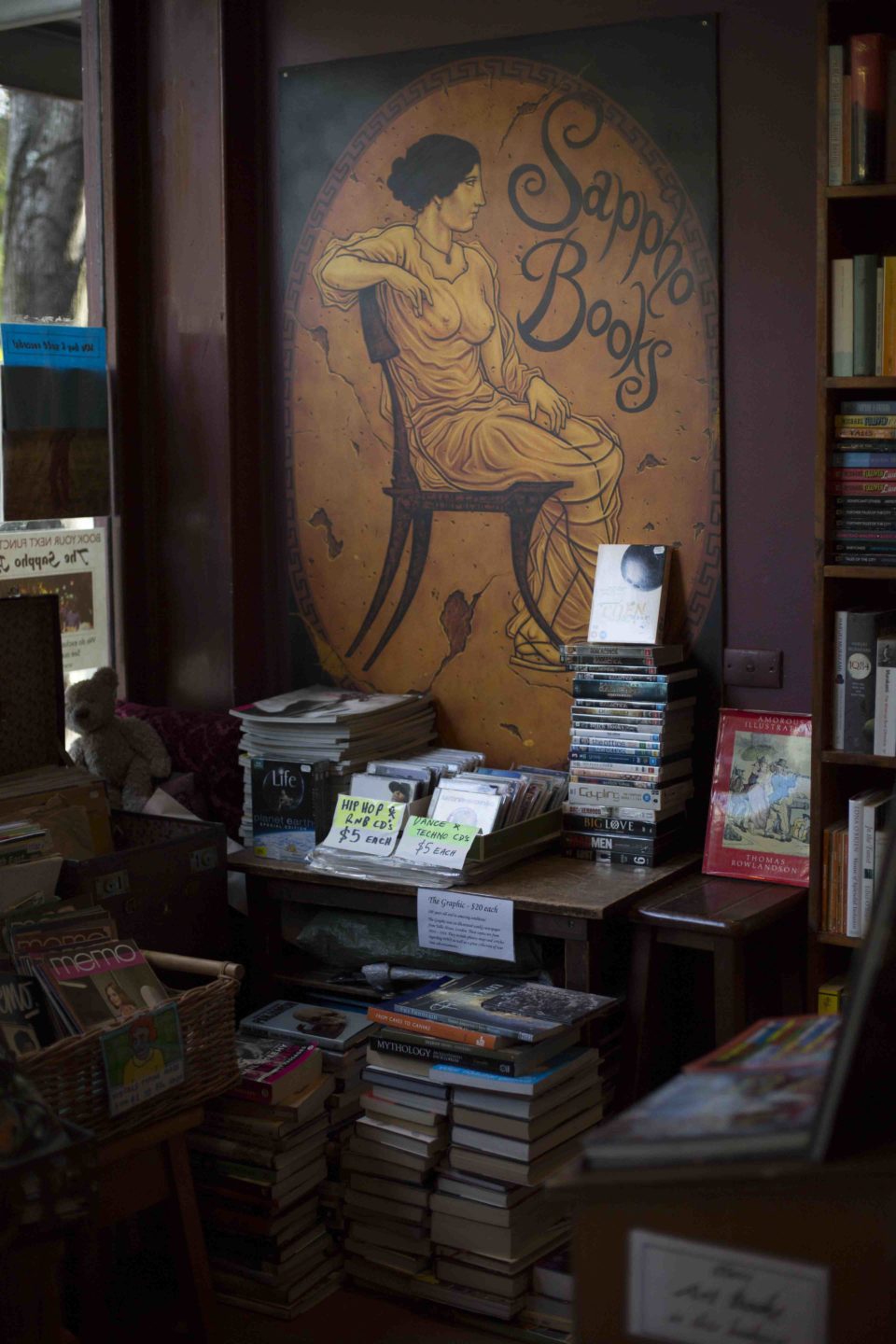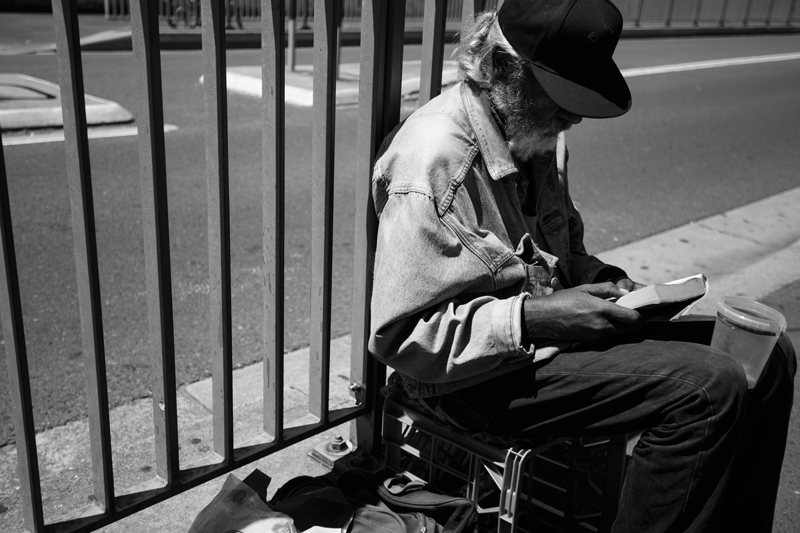“There are no tracks on this part of the Rock. Or if there ever have been tracks, they are long since obliterated.” – Joan Lindsay, Picnic at Hanging Rock.
Some music finds an immediate welcome, some slips into history. Much is lost save for memory. Unmarked Tracks is a monthly consideration of Australian music that pays particular interest to the sounds of the past that journey into the present, or remain undeservedly confined to the off-road paths.
10. Mark McKenna: On Music and Writing (Sydney Writer’s Festival, 25 May)
With sessions from Robert Forster, Jimmy Barnes, Holly Throsby and more, the 2017 Sydney Writers’ Festival offered a popular range of music-related events. But curiosity was particularly piqued by Mark McKenna’s lecture on the relationship between music and the literary imagination. His book, From the Edge: Australia’s Lost Histories, is a cogent argument for the value of the misplaced, the ignored and the forgotten in offering a richer understanding of Australian history. His talk reflected on how music not merely enriches creativity and life but underpins them, subtly altering their rhythms and momentum, transforming the everyday, helping to reveal what’s hidden or possible.
Listen to Philip Adams interviewing McKenna about his last book here.
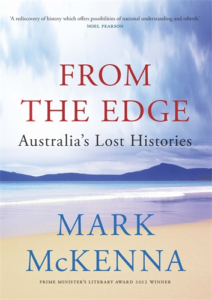
Mark McKenna’s ‘From The Edge’
9. Ian McFarlane, The Encyclopedia of Australian Rock and Pop, 2nd edition (Third Stone Press).
It’s a Meldrum-esque cliché but on this occasion it deserves to be said: if there’s one book that should be on every Australian music fan’s shelf, McFarlane’s encyclopedia is it. This newly-revised edition, some 17 years in the making, is now better illustrated and in a larger format with over 1000 detailed entries. Engagingly written, exhaustively researched, it will continue to be the definitive local reference work, but spare a thought (and an ear) for the ghosts of Australian independent music omitted due to McFarlane’s self-confessed space restrictions. Buy it from Ian direct at thirdstonepress.com.au
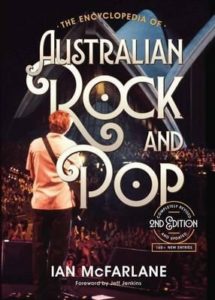
Ian McFarlane’s ‘Australian Rock and Pop’
8. Closed Circuits: Australian Alternative Electronic Music of the ’70s & ’80s Vol. 1 (Warner).
Half of the acts on this collection are too obscure for McFarlane’s tome but that’s not necessarily because they’re difficult listening; there’s as much sparkling, catchy pop here as moody synth-scapes. Closed Circuits is compiled by Melbourne historian and writer David Nichols – be sure to check out his vital recent book, Dig: Australian Rock & Pop Music 1960-1985 – and it taps into growing global interest in marginal electronic genres, tracing the lesser-travelled trails of technology-driven D.I.Y. music-making taken by those who deemed antipodean punk’s three-chord ramalama as reductive as the hegemony of ‘70s pop-pap and blues-boogie. The relative stars of the scene, like Models, Dugites and The Reels, sit alongside intriguing lesser-knowns like The Limp, Karen Marks and Perth’s And An A.
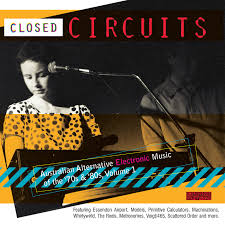
Closed Circuits
7. Repressed Records 15th Anniversary (Sydney Opera House, 1 June).
A notable omission from Closed Circuits is Sydney’s Severed Heads, who were a recent highlight of the most eclectic line-up in the 2017 Vivid Live music calendar. The duo, comprised of founder Tom Ellard and Stewart Lawler – the self-proclaimed “Homer Simpson and Sideshow Bob” of Australian experimental music – were twice the age of most other participants but their nervy dance music remains potent and surprising. Other standouts on the night were the female-fronted pop metal of Miss Destiny and especially Total Control, who infuse unfettered garage rock with the steady driving pulse of minimalist electronics. Or should that be the other way around? Either way it’s an intoxicating blend.
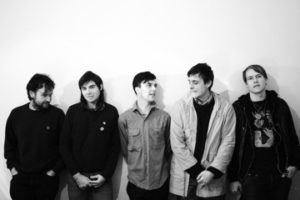
Total Control
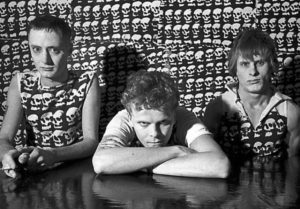
Severed Heads, 1985
6. Follow the Sun – Various Artists (Mexican Summer).
Total Control’s Mikey Young is also the co-compiler of this new anthology of compelling obscurities from the fringes of ‘70s Australian folk and pop. The selections, according to Young’s liner notes, conjure “a simpler more self-contained, innocent Australia… a ‘pre-Crocodile Dundee, Koala Blue, Ken Done’ Australia where the rest of the world was less concerned about us and we were less aware of it.” There’s a sun-dappled, playfully-stoned vibe to most of these 20 cuts, with highlights like the title track by Dave Douglas (complete with spaced-out, spoken-word section) and the mesmerizing ‘Hey, Can You Come Out and Play’ from Megan Sue Hicks’ lost 1972 treasure, Maranatha.
Purchase Follow the Sun here.
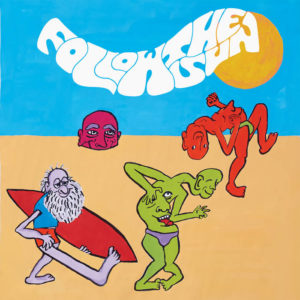
Follow The Sun
5. Kate Hennessy, Music You Missed.
Kate Hennessy’s quarterly feature in The Guardian is a crucial round-up of current home-grown acts that deserve greater exposure. Her most recent piece offers the stage to punks Red Red Krovvy and Orion, indie melodists Nadia Reid and EWAH, Melbourne metal band Desecrator and many more, but it’s her deliberation on ‘A Quality of Mercy’ by RVG – with lyrics about the executions of Andrew Chan and Myuran Sukumaran in Bali – that is most thought-provoking, reinforcing her commitment to both music and journalism that is integrally connected to the broader contexts of Australian culture and politics.
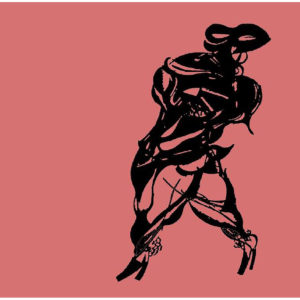
RVG
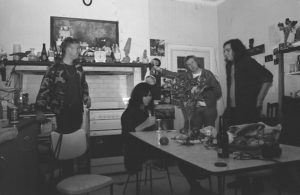
RVG
4. Leong Lau, That Rongeng Sound (Sunscape Records, 1977).
This impossibly-rare Sydney psych-soul-funk gem has recently celebrated its 40th anniversary, so it was timely if surprising when The Australian ran a lengthy feature on the largely-forgotten, now Brisbane-based Malay/Australian musician. Fans of Shuggie Otis and Rodriguez should find much to love, though Lau follows a more abstract, murky groove with improvised vocals reminiscent of Can’s Damo Suzuki but with a relaxed delivery and a distinctly-local accent.
Listen to That Rongeng Sound here, or the full album here.
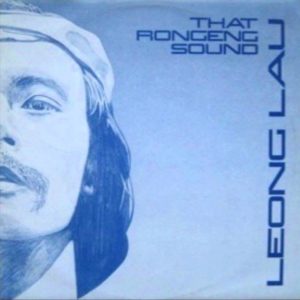
Leong Lau’s ‘That Rongeng Sound’
3. The Atlantics, ‘Come On’ (Sunshine, 1967).
Maroubra’s finest pop band is better known for ‘60s surf instrumentals like ‘Bombora’ but later recruited singer Johnny Rebb, producing some superlative rock singles, like the snarling ‘Come On’ which celebrated its 50th birthday earlier this year. Lyrically it connects with the same urgency as ‘Friday On My Mind’ – both are a wage slave’s insolent roar of faith and lust – and it deserves to be as popular.
The Atlantics website here.
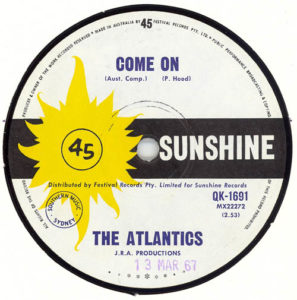
The Atlantics ‘Come on Sunshine’
2. The 50th Anniversary of Australia’s Citizenship Referendum.
As enjoyable as 1967: Songs in the Key Of Yes was when it was performed in Sydney earlier this year, this multi-artist celebration of indigenous music – commemorating the 50th anniversary of the May 1967 referendum that removed discriminatory references from the Australian constitution – exhibited a curious absence. It featured no contemporaneous local music from the 1960s, relying instead on the songbook of American civil rights (Bob Dylan, Nina Simone, Sam Cooke) to make its point. What are we to take from that? That our country had no songs of protest against racial intolerance to sing in the 1960s? That seems unthinkable, yet pioneering indigenous musicians like Dougie Young, Georgia Lee, Jimmy Little and others were not yet singing songs of collective dissent, only (at most) personal liberty. That illustrates just how much needed to change and what a long road it would be. What was number one on the Australian charts when we went to the polls on 27 May 1967? ‘Something Stupid’ by Nancy & Frank Sinatra.
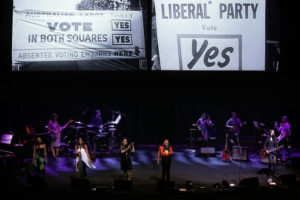
‘Songs in the Key of Yes’ concert. Image: Prudence Upton
1. The Go-Betweens: Right Here (Sydney Film Festival, 15 & 16 June) and Descent into the Maelstrom: the Untold Story of Radio Birdman (Event Cinema George St, 19 June).
Two of the country’s most revered cult bands are celebrated in feature documentaries that will be premiered in Sydney in June within days of each other. It’s tempting then but ultimately reductive to view the bands in binary terms – with the Go-Bees as sunny/pop/female/indie and Birdman as dark/rock/male/punk – given both tales feature more complex truths and are equally marked by drama and conflict. It will be intriguing to see how each film is welcomed nationally and globally, and whether both bands continue to be seen as rare exceptions of pioneering Australian musical creativity, or as merely two of the best-known examples of a flourishing independent music culture that deserves more general interest and acclaim.
Find The Go-Betweens film and tickets here.
Find Radio Birdman film and tickets here.
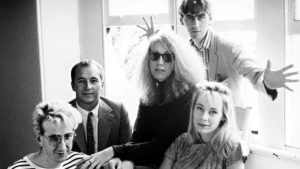
The Go-Betweens


